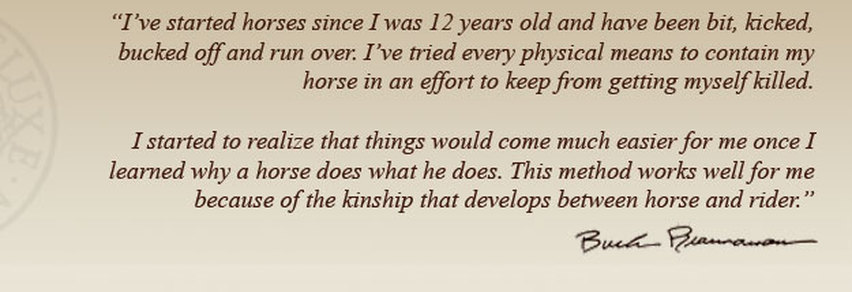Brannaman was born in 1962 in Sheboygan, Wisconsin, and
raised in Montana and Idaho. Brannaman was for many years a disciple of Ray
Hunt, one of the founders of the natural horsemanship movement, and also
inspired by Tom and Bill Dorrance. Brannaman now teaches clinics worldwide.
About the clinics, he has noted, "the goal for clinics really is to just
try to get the human being to understand as much about their horse as I can
help them to understand."
Brannaman had a difficult childhood, characterized by considerable child abuse at the hands of his father, to the extent that he and his brother spent a number of years in foster care placement. He took solace in horses, and learned from his own experiences, to look at a situation from the point of view of the horse. Brannaman has written:
"I've started horses since I was 12 years old and have been bit, kicked, bucked off and run over. I've tried every physical means to contain my horse in an effort to keep from getting myself killed. I started to realize that things would come much easier for me once I learned why a horse does what he does."
He later used these experiences in his career as a horse trainer, recognizing in difficult animals the same fear and hostile reactions he remembered from his own childhood:
"Abused horses are like abused children. They trust no one and expect the worst. But patience, leadership, compassion and firmness can help them overcome their pasts."
In recent years, he has become a motivational speaker for groups outside of the horse world, frequently describing the connection between animal abuse and abuse of children and other human beings. "For me, these principles are really about life," says Brannaman, "about living your life so that you're not making war with the horse, or with other people."
Brannaman is also a skilled Trick Roper, having performed rope tricks in television commercials since he was six years old. For his roping abilities, Brannaman also holds two spots in the Guinness Book of World Records. Though Brannaman has said, "my dad gave us the choice of practicing roping tricks or getting whipped," he still takes pride in his skill, offers roping and cattle working clinics, and retains a close connection to the historic vaquero cowboy tradition of the western United States.
Brannaman had a difficult childhood, characterized by considerable child abuse at the hands of his father, to the extent that he and his brother spent a number of years in foster care placement. He took solace in horses, and learned from his own experiences, to look at a situation from the point of view of the horse. Brannaman has written:
"I've started horses since I was 12 years old and have been bit, kicked, bucked off and run over. I've tried every physical means to contain my horse in an effort to keep from getting myself killed. I started to realize that things would come much easier for me once I learned why a horse does what he does."
He later used these experiences in his career as a horse trainer, recognizing in difficult animals the same fear and hostile reactions he remembered from his own childhood:
"Abused horses are like abused children. They trust no one and expect the worst. But patience, leadership, compassion and firmness can help them overcome their pasts."
In recent years, he has become a motivational speaker for groups outside of the horse world, frequently describing the connection between animal abuse and abuse of children and other human beings. "For me, these principles are really about life," says Brannaman, "about living your life so that you're not making war with the horse, or with other people."
Brannaman is also a skilled Trick Roper, having performed rope tricks in television commercials since he was six years old. For his roping abilities, Brannaman also holds two spots in the Guinness Book of World Records. Though Brannaman has said, "my dad gave us the choice of practicing roping tricks or getting whipped," he still takes pride in his skill, offers roping and cattle working clinics, and retains a close connection to the historic vaquero cowboy tradition of the western United States.
Trailer from the documentary about Buck.

